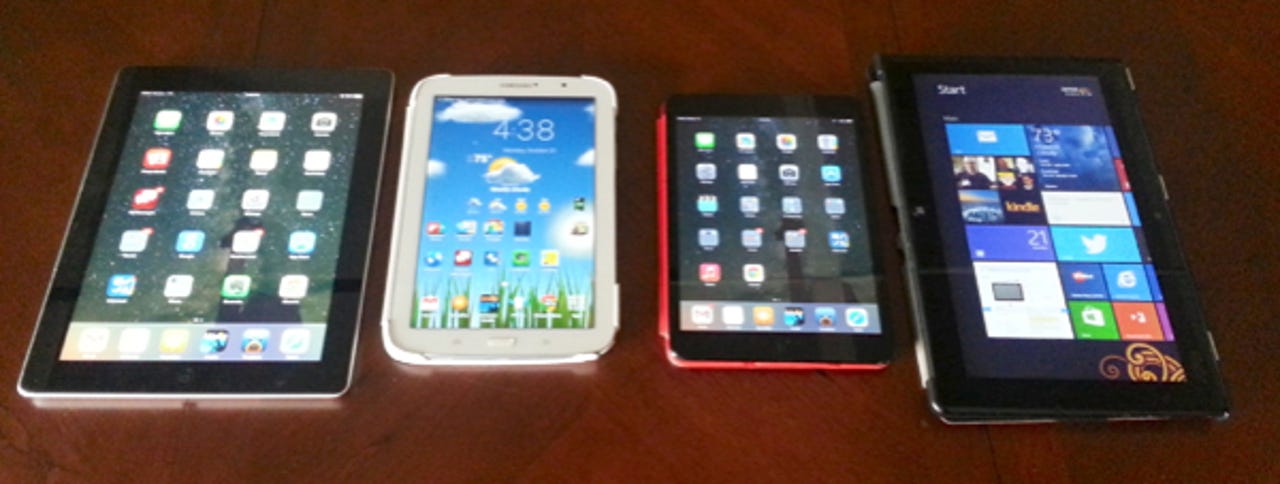Tablets: Hitting the wall for innovation

The days leading up to the forthcoming new iPad unveiling by Apple has seen a lot of speculation about the innovation (and possible lack thereof), that the company may spring on consumers. Some pundits believe the new iPads will be a minor evolution of the product line, and others that Apple will wow us with unexpected functionality for the new tablet. The fact is, tablets have already evolved to the point where they can do virtually everything consumers want, and in that regard they may have already hit the wall.
A good article by ZDNet's Larry Dignan compares tablets to the netbook, and suggests maybe the tablet is going away like those cheap notebooks of a while back. He makes some good points but I don't think we'll see tablets going the way of the netbook and the dodo.
Apple's iPad Air event
Netbooks were Windows laptops (after the first Asus Eee PC) that were smaller and much cheaper than the notebooks of that time. Consumers snapped up netbooks in droves, primarily due to how cheap they were. You could almost buy four netbooks for the price of some laptops of that time.
The cheap price of the netbook contributed to its extinction in the market as the competition drove regular laptop prices down significantly. Once laptop prices plummeted there was no reason to put up with performance compromises of netbooks. The bigger laptops were also easier to use than the smaller netbooks with cramped keyboards. People started buying cheap laptops, even though not quite as cheap as netbooks, to avoid the compromises mentioned. The netbook soon disappeared from store shelves due to lack of sales.
We won't see the same happen with tablets as they stand alone in form and function. They aren't replacing laptops or other PCs, they have a unique use case (e. g. consuming media in the hands) that laptops can't adequately duplicate. They can be used with keyboards to do tasks otherwise done on laptops, but the reverse is not the case. People like using tablets for casual computing and that's not going to change.
While tablets aren't likely going away any time soon like the netbook, they have evolved to the point where there's not a lot more functionality they'll pick up. There are good tablets on all three of the major platforms, iOS, Android, and Windows 8, that do everything a consumer wants to do with the slate. They are all good at consuming content, surfing the web, and working with social networks, and do it most anywhere. They can do that from the comfy sofa in front of the TV especially, and many tablet owners love that.
While there are differences in apps across the platforms, there aren't many things that consumers want to do that can't be done on any of today's tablets. Web browsers are good enough that even if apps don't exist that owners would like, they can often use the web to compensate for that.
Featured
Tablets today are full-featured across the board, and there's not much they can't do as far as owners are concerned. They've hit the wall in that regard, and evolution is now on the software side. App development will continue and owners will appreciate that, but it's not going to significantly move forward.
The hardware is really good so even that doesn't leave much room for big leaps forward. There are tablets of all sizes to appeal to most everyone, and they all do pretty much what the other models do. We'll see small hardware improvements going forward but not major changes. Tablets are thin and light, with long battery life, and there's nowhere for them to go forward as far as hardware is concerned.
Some will argue that the many different styles of Windows hybrids, aka 2-in-1's, are pushing the hardware envelope for tablets but that's not exactly true. They are pushing the laptop envelope, but the tablet side of the hardware is pretty much business as usual for the slate.
Apple may surprise us with the new iPads but probably not very much. Whatever they unveil will likely do what all the other tablets out there do. It may look different doing it, and it may do it somewhat better for now, but that will be about it. There's not a lot of room for improvement for small, thin slabs that are touch devices. Consumers will keep buying them because they like what they can do, not because they do new things differently.
Don't mistake this as a complaint, it's rather acknowledging how good tablets have become in a short time. The four tablets owned by the writer, on all three major tablet platforms, are all great pieces of hardware. They are about as good as tablets can be, and that's the point.
See also:
